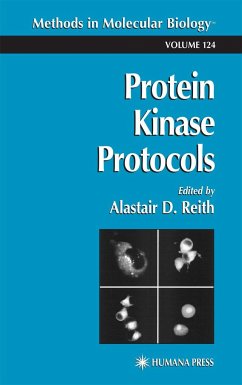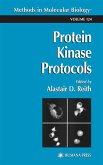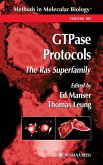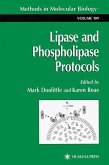As key components of many cell signaling pathways, protein kinases are implicated in a broad variety of diseases, including cancers and neurodegenerative conditions, and offer considerable potential as tractable targets for therapeutic intervention. In Protein Kinase Protocols, a panel of highly skilled laboratory investigators describe both basic and more sophisticated methods for the analysis of kinase-mediated signaling cascades, with emphasis on the identification of proteins according to their interactive relationships and the analysis of their functional properties. Described in step-by-step detail, these readily reproducible techniques offer novices quick access to a complicated field, and provide more experienced investigators many novel time-saving ploys. Emphasis is given to the critical technical steps that are often omitted from methods published in the primary literature. There are also tips on potential pitfalls and copious notes on how to adjust the protocols to work in related systems.
Broad in its range of techniques and thoroughly detailed to help ensure experimental success, Protein Kinase Protocols offers both novice and experienced investigators powerful tools for understanding the functional roles of specific protein kinases within signaling cascades and for identification and evaluation of novel therapeutic targets.
Broad in its range of techniques and thoroughly detailed to help ensure experimental success, Protein Kinase Protocols offers both novice and experienced investigators powerful tools for understanding the functional roles of specific protein kinases within signaling cascades and for identification and evaluation of novel therapeutic targets.
"By engaging high-ranking experts as authors of the individual chapters the editor has succeeded in compiling an updated an highly useful compendium of today's technology in protein kinase research. besides its topicality, this book has the particular advantage that the chapters are arranged according to a constantly recurring scheme, that is, beginning with a comprehensive introduction, which provides the appropriate key references, and then continuing with very detailed experimental instructions, which are given clearly enough to enable even a less experienced experimentator to follow. The "Notes" at the end of each chapter are extremely helpful, in which the experimental steps are critically examined and explained in detail....for students and newcomers in the field it provides an excellent introduction to the methodology of protein kinase research, and for the experienced scientist it will be a highly valuable work of reference and an indispensable companion in daily laboratory work." - Chembiochem "The authors are all experienced researchers with some eminent names among them. Each of the chapters has been contributed by scientists with considerable expertise in the areas included, leaving the reader with knowledge that the protocols are thoroughly tried and tested. All in all, the book presents a wide range of specialized techniques which those working on (or intending to work on) kinases would find a very useful addition to their laboratories." - Cell Biology International








